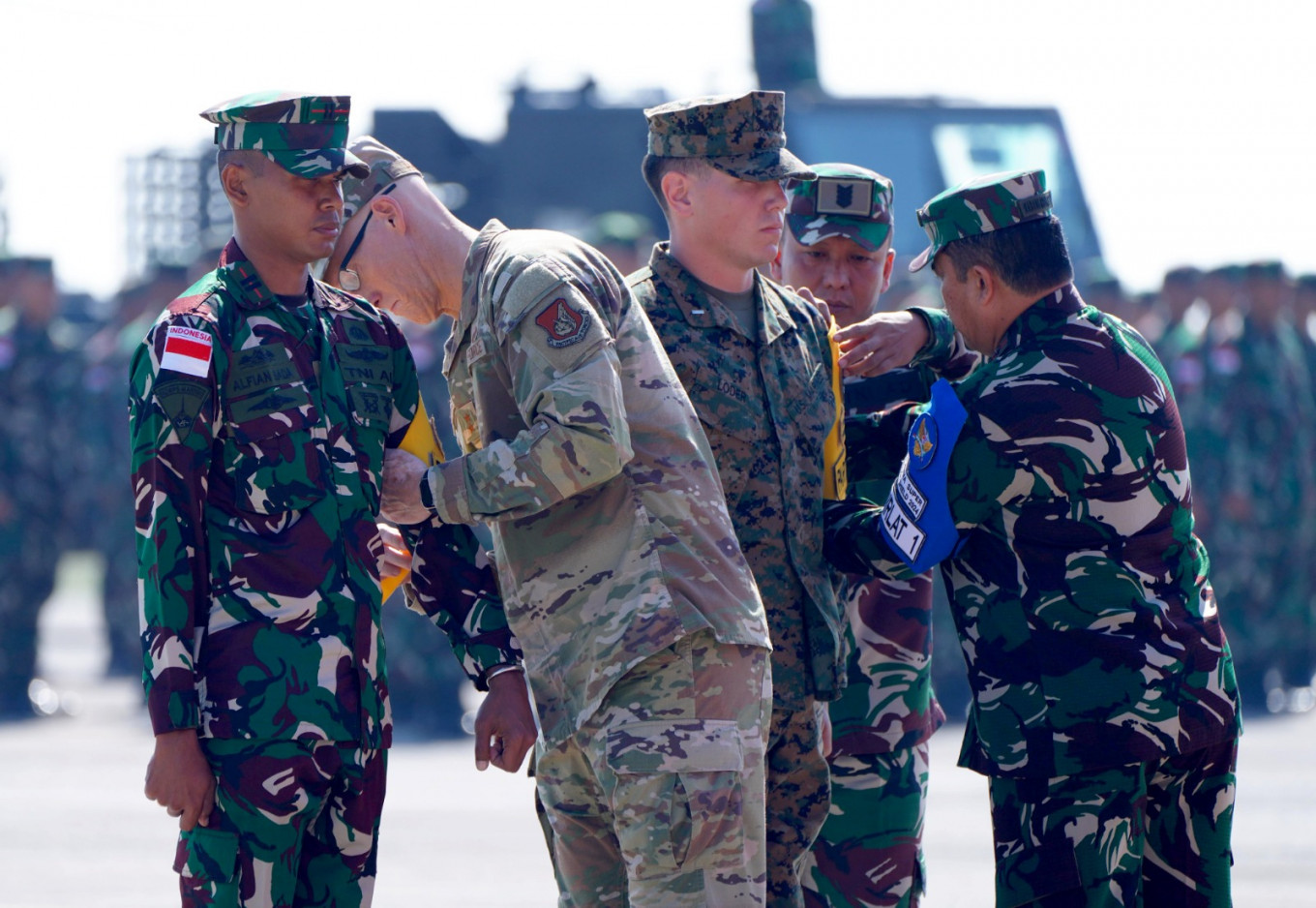Popular Reads
Top Results
Can't find what you're looking for?
View all search resultsPopular Reads
Top Results
Can't find what you're looking for?
View all search resultsDefending RI’s interests
The Defense Ministry must carefully decide which cooperative activities it will engage in, especially given Australia’s ambitious nuclear-powered submarine program, part of the trilateral AUKUS pact.
Change text size
Gift Premium Articles
to Anyone
 The Hawaii National Air Guard commander Maj. Gen. Joseph R. Harris II (second left) attaches participant armband to an Indonesian Military (TNI) personnel (left) while TNI Education and Training Command deputy commander Vice Marshal Widyargo Ikoputra (right) attaches the armband to a US military personnel (center) during the opening ceremony of the Super Garuda Shiled multinational joint exercise in Situbondo, East Java, on Monday, Aug. 26, 2024. The multinational joint exercise runs until Sept. 6. (Courtesy of the Indonesian Military/-)
The Hawaii National Air Guard commander Maj. Gen. Joseph R. Harris II (second left) attaches participant armband to an Indonesian Military (TNI) personnel (left) while TNI Education and Training Command deputy commander Vice Marshal Widyargo Ikoputra (right) attaches the armband to a US military personnel (center) during the opening ceremony of the Super Garuda Shiled multinational joint exercise in Situbondo, East Java, on Monday, Aug. 26, 2024. The multinational joint exercise runs until Sept. 6. (Courtesy of the Indonesian Military/-)
I
ndonesia has been very active in the realm of defense over the past few months, with activities ranging from joint exercises to leveling up its defense cooperation agreement (DCA) with Australia.
On Thursday, Defense Minister Prabowo Subianto and Australian Deputy Prime Minister and Defense Minister Richard Donald Marles signed a DCA at the Indonesian Military Academy in Magelang, Central Java, after rounds of talks that began in March 2023.
Both countries welcomed the upgraded agreement, noting that it was “treaty-level” and “legally binding”.
While many of the provisions in the new DCA are business as usual, such as those providing for enhanced joint exercises and training and education exchanges, the agreement contains several new elements that reflect the strengthened ties.
In a press release, Australia said the treaty-level agreement would allow it and Indonesia “to operate from each other’s countries for mutually determined cooperative activities”.
The phrase “to operate” might easily be confused with “to deploy”, which would suggest a permanent Australian military presence in Indonesia, a situation that would run counter to the country’s foreign policy principles.
However, even before this clause came into existence, the Indonesian Military (TNI) and the Australian Defence Force had been operating in each other’s countries through joint exercises and, more operationally, numerous humanitarian aid and disaster relief missions, such as during the 2004 Aceh tsunami and the 2020 Australian bush fire.
Therefore, it is up to both countries to define the “cooperative activities” that would allow military operations from each other’s countries. Whatever these are, Indonesia will likely stick to its “free and active” foreign policy doctrine, meaning it will not join any military bloc or pact.
As part of this free and active diplomacy, Indonesia has hosted foreign militaries and participated in joint exercises abroad to improve the TNI’s interoperability with friendly countries.
The Defense Ministry must carefully decide which cooperative activities it will engage in, especially given Australia’s ambitious nuclear-powered submarine program, part of the trilateral AUKUS pact.
If it is not careful, Indonesia may find itself in a difficult situation if Australia invokes the operational point and turns Indonesia into a launching pad for operations in the South China Sea or the Pacific Ocean, in the event, for example, that Australia goes to war with China.
Indonesia does not have a regularly occurring joint exercise with China, although the TNI does employ several Chinese-made weapons systems. China is also currently offering its S26T diesel-electric submarines and Type 055 guided missile destroyers to strengthen the Indonesian Navy’s fleet.
It remains to be seen whether Prabowo will move forward with this offer, despite having said that he would prioritize weapon acquisitions from countries with veto rights at the United Nations Security Council, which China has.
As for the DCA with Australia, Indonesia highlighted a plan to form a joint United Nations mission between the TNI and the Australian Defense Force (ADF), a point the Australian government did not emphasize.
Indonesia has been involved in numerous UN peacekeeping missions, while Australia is mostly active in the Pacific Islands as the region’s primus inter pares.
Despite their differences in interests, Indonesia and Australia have been working closely in various bilateral and multilateral joint exercises, such as the Super Garuda Shield, which opened on Monday and will last until Sept. 6. The annual joint drills, organized by Indonesia and the United States, will take place in Situbondo, East Java; Karawang, West Java; and Baturaja, South Sumatra.
From July 12 to Aug. 2, the Indonesian Air Force took part in Exercise Black Pitch 2024 in Australia, and from July 20 to 27 it welcomed the French Air and Space Force’s Pégase Mission 2024, the French military branch’s annual visit to the Indo-Pacific. Also in July, the Indonesian Navy participated in the Rim of the Pacific Exercise in the waters around Hawaii, the US.
The TNI’s participation shows that Indonesia is open to cooperation with friendly countries, both bilaterally and multilaterally.
With president-elect Prabowo’s inauguration approaching, we can expect he will strengthen Indonesia’s defense relations with other powers to advance regional peace and prosperity.










